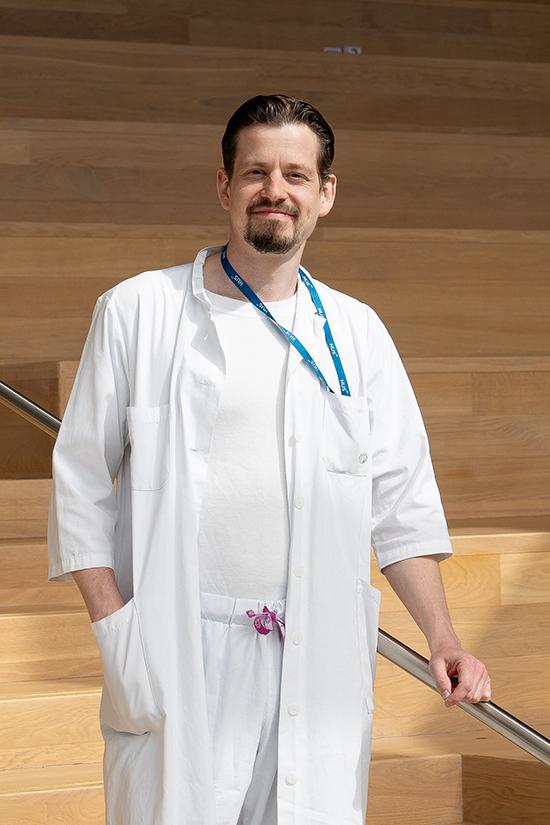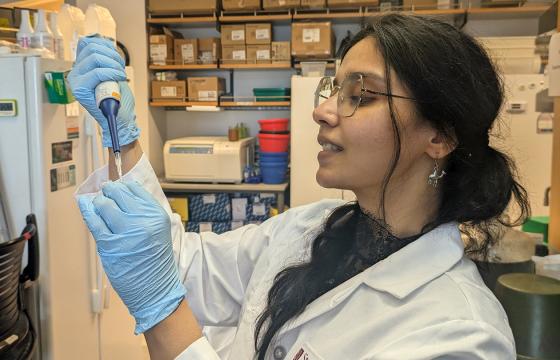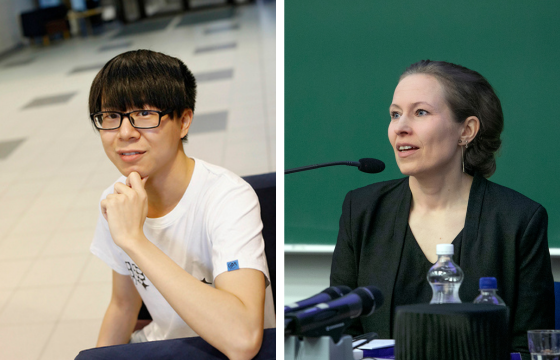
Text: Anne Salomäki
Photos: Petri Summanen
Specialist, Adjunct Professor Timo Carpén wants to treat his patients as comprehensively as possible. That’s why he enjoys working in palliative care, meaning caring for patients with serious and terminal illnesses.
“Palliative care work is very wide-ranging, and it entails tight-knit teamwork with nurses and other professionals as well as the patient’s next of kin. I consider it to be the heart of a physician’s work,” Carpén says.
Palliative care affects many of us both directly and indirectly: The World Health Organization (WHO) estimates that around 75 000 people in Finland need palliative care every year, and the number is on the rise. The recipients of palliative care include patients with, for example, cancer and lung, kidney, and heart diseases; and the care has been shown to improve the patient’s quality of life, reduce the use of hospital services at the end of life, and considerably ease the burden on the patient’s loved ones.
According to scientific research, palliative care is the more beneficial the earlier it begins. Now, Carpén is going to the Princess Margaret Cancer Centre in Toronto, Canada for a two-year fellowship period to study whether virtual symptom screening could be helpful in finding cancer patients with the most difficult symptoms and referring them to specialised palliative care efficiently and in a timely manner. The research compares virtual screening to the traditional route, which is a screening and evaluation by an oncologist.
Tied in with global phenomena
The research group’s work is linked to various global trends. The population is ageing both in Finland and other industrialised countries, resources in healthcare are being fiercely debated, and the covid-19 pandemic accelerated digitalisation, including in healthcare.
Currently, the challenge in targeting palliative care is to identify those with the highest symptom burden and who would benefit from care the most in a vast group of patients. The term symptom burden, Carpén explains, refers to mental, social, psychological, and physical suffering, such as anxiety, pain, and nausea.
A study previously conducted in Toronto has indicated that a well-functioning screening can help find patient groups that benefit most from palliative contact. Carpén will participate in a research group led by Professor Camilla Zimmermann and the second phase of the study, investigating the effectiveness of a virtual symptom screening in a randomised controlled trial.
Carpén believes that as the properly targeted virtual screening produces real-time information about patients and helps identify patients with the highest symptom burden, the care pathways can be significantly sped up and the patients’ quality of life improved. As palliative contact has been found to reduce the use of costly hospital and emergency services, the pressure on healthcare resources is also eased.
The number of people needing palliative care will not be reducing in the future. Carpén points out that patients range from small children to the elderly, and the population is constantly ageing.
Aiming for efficiency
Although the pandemic gave digitalisation a boost, Carpén thinks that there’s still plenty of room for development when it comes to digital healthcare tools. However, their limitations need to be taken into account, too.
“That’s why they must be used mainly with the kinds of patients and fields in which they have already been proven useful and efficient. More scientific evidence of their use is also needed,” Carpén adds.
If the research results show that virtual screening works, digital symptom screening can be utilised better in the future – including in Finland. According to an assessment by WHO, in an international comparison Canada is at the top and well ahead of Finland in palliative care. Hence Carpén deems it important that research expertise and new insights can be brought to Finland from abroad in order to help develop and improve the level of palliative care in the country.
Right now, Carpén is supervising several PhD students in a Finnish research project, led by Professor Tiina Saarto, studying the implementation of end-of-life care for adults who have died of chronic life-limiting illnesses nationwide. When his two-year stint in Canada comes to an end, Carpén is planning to set up his own research group in Finland.
“Organising the best possible care for patients whilst trying to allocate limited resources correctly is a big task, and there are various challenges that need to be tackled,” he says. “However, I still view the way the future is headed in a very positive light.”
Doctor of Medicine, Adjunct Professor Timo Carpén received a grant from the Finnish foundations’ post doc pool in 2024 for postdoctoral research at the Princess Margaret Cancer Centre in Canada. In his research, he studies the effects of virtual symptom screening on early access to palliative care.



